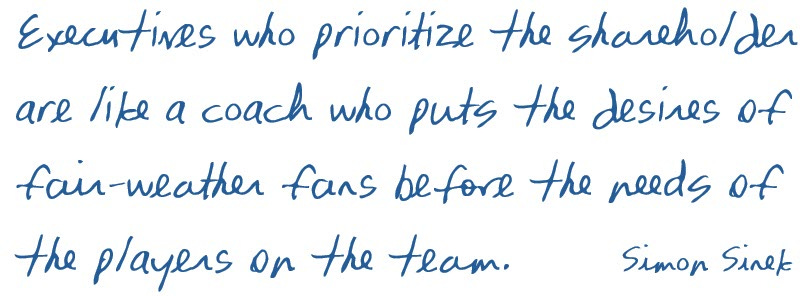The Leadership Loyalty Test
Discover how putting your team first creates sustainable success and builds lasting organizational value.
Simon Sinek, renowned leadership expert and author of Start With Why, offered this insight during the aftermath of the 2008 financial crisis, when many companies sacrificed long-term stability for short-term gains. The quote came from his observations of companies that survived and thrived during this period versus those that faltered. Sinek noticed that organizations prioritizing employee welfare and team culture consistently outperformed those focused solely on shareholder returns. This perspective gained relevance as companies like Costco maintained employee-first policies despite Wall Street pressure, while others faced cultural collapse pursuing profit at any cost.
Leadership Principles
Primary Principle: Sustainable Leadership Through People-First Culture: Consider a tech startup facing pressure from investors to cut training budgets and reduce employee benefits to show better quarterly numbers. A wise leader would resist this pressure, understanding that investing in team development and wellbeing creates long-term competitive advantages through increased innovation, loyalty, and productivity.
Secondary Principle: Balanced Stakeholder Management: A retail chain manager must choose between maintaining full staffing levels during challenging times or reducing headcount to meet profit targets. The enlightened approach involves finding creative solutions to protect both team stability and business sustainability, perhaps through temporary shared sacrifices rather than layoffs.
Philippians 2:3-4 powerfully aligns with Sinek's message: "Do nothing out of selfish ambition or vain conceit. Rather, in humility value others above yourselves, not looking to your own interests but each of you to the interests of the others." This scripture directly addresses the heart of authentic leadership - putting others' needs before self-interest. Just as Paul challenges believers to adopt a servant leadership mindset, modern leaders must resist the temptation to prioritize short-term financial gains (selfish ambition) over the wellbeing of their teams. This passage reminds us that true leadership success comes through humble service and genuine concern for those we lead.
I worked with a manufacturing company executive who faced intense board pressure to offshore production for cost savings. Instead, he invested in local workforce development and process improvements. While profits initially lagged competitors, his company achieved industry-leading quality metrics, reduced turnover, and increased productivity. The results vindicated his people-first approach, demonstrating how prioritizing team needs creates sustainable competitive advantages.
Reflection Questions:
How do your daily leadership decisions reflect your priorities between short-term results and long-term team development?
What signals are you sending to your team about their value relative to financial metrics?
Where might you be sacrificing sustainable growth for quick wins?
How would your leadership approach change if you knew you'd be leading this same team for the next decade?
Ready to build a leadership approach that creates lasting value through people-first principles? Schedule a complimentary discovery call to explore how our proven coaching methodology can help you develop a sustainable leadership style that serves both your team and your organization's long-term success.
Let's transform your leadership impact together.
Feeling thankful for those who've shaped your journey? Pay it forward by sharing this newsletter with someone who might benefit from these insights—your small gesture today could help them discover their extraordinary potential tomorrow.




